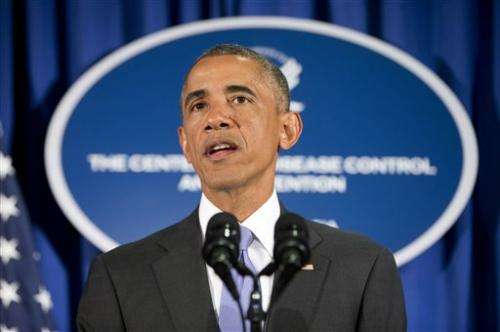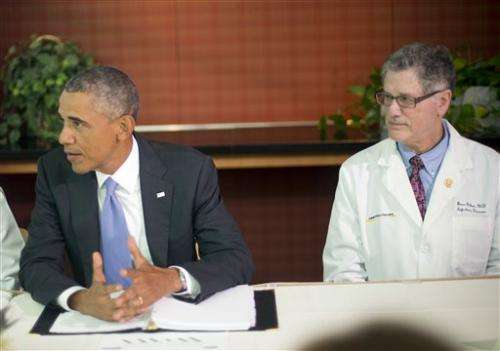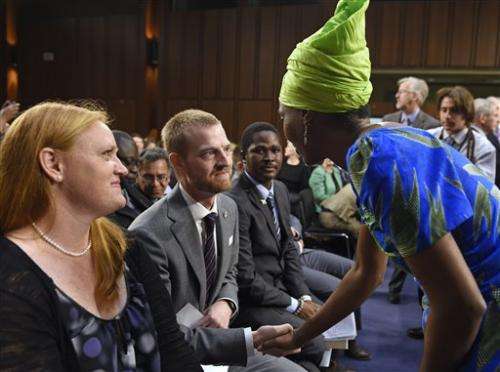Obama's Ebola response: Is it enough and in time?

President Barack Obama declared Tuesday that the Ebola epidemic in West Africa could threaten security around the world, and he ordered 3,000 U.S. military personnel to the region in emergency aid muscle for a crisis spiraling out of control.
The question was whether the aid would be enough and was coming in time. An ominous World Health Organization forecast said that with so many people now spreading the virus, the number of Ebola cases could start doubling every three weeks.
"If the outbreak is not stopped now, we could be looking at hundreds of thousands of people affected, with profound economic, political and security implications for all of us," Obama said Tuesday after briefings in Atlanta with doctors and officials from the Centers for Disease Control and Prevention and Emory University.
Obama called on other countries to join in quickly supplying more health workers, equipment and money.
"It's a potential threat to global security if these countries break down," Obama said, speaking of the hardest-hit nations of Liberia, Sierra Leone and Guinea. At least 2,400 people have died, with Liberia bearing the brunt. Nearly 5,000 people have fallen ill in those countries and Nigeria and Senegal since the disease was first recognized in March. WHO says it anticipates the figure could rise to more than 20,000, and the disease could end up costing nearly $1 billion to contain.
Obama described the task ahead as "daunting" but said there was hope in the fact that "the world knows how to fight this disease."
His expression grim, he described the "gut-wrenching" scene of a family in Liberia. The father had died, the mother was cradling a sick 5-year old, her 10-year-old was dying, too, and the family had reached a treatment center but couldn't get in.
"These men and women and children are just sitting, waiting to die, right now." Obama said. "And it doesn't have to be this way."
The U.S. is promising to deliver 17 hundred-bed treatment centers to Liberia, where contagious patients often sit in the streets, turned away from packed Ebola units. The Pentagon expects to have the first treatment units open within a few weeks, part of the heightened U.S. response that also includes training more local health care workers.
"This massive ramp-up of support from the United States is precisely the kind of transformational change we need to get a grip on the outbreak and begin to turn it around," said WHO Director-General Margaret Chan.
Doctors Without Borders, which has sounded the alarm for months, also welcomed the U.S. effort but said it must be put into action immediately—and that other countries must follow suit because the window to contain the virus is closing.

"The response to Ebola continues to fall dangerously behind, and too many lives are being lost," said Brice de le Vingne, the group's director of operations. "We need more countries to stand up, we need greater concrete action on the ground, and we need it now."
Dr. Kent Brantly, an American physician who survived Ebola he contracted while working in Liberia, met with Obama at the White House Tuesday. He is one of three aid workers with Ebola who have been treated at Emory.
Later, he told a packed Senate hearing, "We must move quickly and immediately to deliver the promises that have been made."
CDC's Dr. Beth Bell told senators the outbreak is "ferocious and spreading exponentially."
"If we do not act now to stop Ebola, we could be dealing with it for years to come," she warned.
Congress still must vote on an Obama administration request for $88 million more to help the Ebola fight, including funding CDC work in West Africa through December and speeding development of experimental treatments and vaccines.
An aid worker from Sierra Leone put a face on the region's desperation. Ishmeal Alfred Charles of Freetown told senators that as he prepared to leave home, his 10-year-old daughter asked, "They said there is no Ebola in America. Why can't you take us along?"
The U.N. Security Council will hold an emergency meeting Thursday on the crisis, and the head of the United Nations said the General Assembly will follow up with a high-level meeting next week as the world body "is taking the lead now" on the international fight.
U.N. Secretary-General Ban Ki-moon welcomed Obama's plan, his spokesman said in a statement, and called on the international community "to be as bold and courageous in its response as those who are on the frontlines fighting this disease."

White House press secretary Josh Earnest said the 3,000 troops would not provide direct care to Ebola patients. In addition to delivering the 17 treatment facilities, they will help train as many as 500 local health care workers a week. Among the other initiatives, the military will:
—Set up a headquarters in Monrovia, Liberia, led by Maj. Gen. Darryl Williams, head of U.S. Army Africa.
—Build a regional transportation and staging base in Senegal where the U.S. will help coordinate the contributions of other allies and partners.
—Provide home health care kits to hundreds of thousands of households, designed to help healthy people caring for Ebola-stricken family members. That includes 50,000 that the U.S. Agency for International Development will deliver to Liberia this week.
—Carry out a home- and community-based campaign to train local populations on how to handle exposed patients.
In Monrovia, Boima Folley runs a sport materials shop and said he'd welcome the U.S. military response.
"We have been praying to get the disease wiped out of our country, so if the coming of U.S. troops will help us get that done, we should be happy," he said. "The soldiers don't have to have medical backgrounds."
The U.S. already has spent more than $100 million fighting the outbreak. Obama administration officials said some of the costs of the new military response would be covered by $500 million in overseas contingency operations, such as the war in Afghanistan, that the Pentagon already has asked Congress to redirect for West Africa and for humanitarian assistance in Iraq. The Obama administration submitted a request to Congress late Tuesday to reprogram another $500 million in defense money for efforts against the disease.
© 2014 The Associated Press. All rights reserved.















